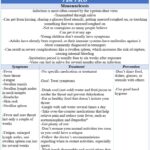Can you really get it from kissing?
When most people hear the word mononucleosis, they probably think of teenagers and kissing. While this might be accurate most of the time, adults and young children can get it too. Also, kissing isn’t the only way it can be spread. How is it transmitted? How serious of an infection is it? How is it treated?
 Definition
Definition
Mononucleosis, or mono, is an infection often caused by the Epstein-Barr virus. It’s transmitted through saliva, meaning not only can you get it from kissing but from sharing a glass or food utensils with someone who is sick. It’s also transmitted if an infected person sneezes or coughs on you or you touch something they sneezed or coughed on. However, it’s not as contagious as many believe—you’re more likely to get a common cold than mono. Anyone can get mononucleosis. Since young children don’t usually have symptoms and most adults have already been exposed to the virus, so their immune systems have antibodies against it. This is why it seems to be more commonly diagnosed in teenagers. It takes between 4 – 6 weeks after exposure for symptoms to start.
Symptoms include fever, sore throat, fatigue, swollen tonsils, swollen lymph nodes in your neck/armpits, headache, skin rash, and a swollen spleen. The incubation period is usually four to six weeks after exposure. The fever and sore throat typically last only a couple of weeks, but fatigue, enlarged lymph nodes, and swollen spleen can last for several weeks. Sometimes, it’s misdiagnosed as strep throat and treated with antibiotics, but the symptoms don’t get any better. If this is the case, it’s a good indication that you might have mono. If you have any of these symptoms and your condition isn’t improving after a week, you should see a doctor.
The doctor can confirm if you have mono, so you’ll know what to do for treatment and prevent complications. Sometimes, the complications can be severe. Your spleen has a significant amount of blood flow through it, so when it’s swollen, it’s at increased risk of rupturing and causing internal bleeding. It’s vital the doctor examines you to determine if your spleen is swollen. They’ll recommend you avoid vigorous activities, like sports, for several weeks if there’s any swelling. Some other less common complications include hepatitis (inflammation of your liver), jaundice (yellowing of your skin due to liver damage), anemia (low amount of red blood cells), thrombocytopenia (low amount of platelets, which help your blood clot), myocarditis (inflammation of your heart), meningitis (inflammation of the lining of your brain), encephalitis (swelling of your brain), Guillain-Barre syndrome and extreme swelling of your tonsils making it difficult to breathe.
Treatment
There isn’t a specific medication or treatment for mononucleosis. Since a virus causes it, antibiotics aren’t effective in treating it. The best way to feel better is to treat the symptoms. If your throat is sore, drink cool (not cold) water and fruit juices to soothe it. Not only will this help your throat, it’ll also prevent dehydration. Eating as healthy as possible is essential while trying to find foods that won’t irritate your throat. Another option to lessen your sore throat is to gargle with salt water several times a day. The correct ratio is about half a teaspoon of salt to every eight ounces of warm water.
It’s helpful to take over-the-counter medications that help relieve pain and reduce your fever, such as acetaminophen and ibuprofen. (Note: Do not give aspirin to children under 16 because it has been linked to causing Reye’s syndrome). Since the fatigue can last several months, it’s vital to get plenty of rest and don’t resume normal activities too soon, or you could have a relapse. Always follow your doctor’s recommendations regarding when to restart activities, especially sports, that could increase your risk of a ruptured spleen.
A key thing to remember is that while your immune system fights mononucleosis, it’s more susceptible to contracting a secondary infection because it’s not as strong as it typically is. If you develop a secondary infection, see your doctor for treatment, take any medication they prescribe until it’s completed, and follow all of their instructions.
Prevention
The best way to prevent mononucleosis, or a secondary infection, is by not sharing food, dishes, glasses, or utensils with others. Doing this is especially vital if you know someone has had a recent mono infection because the virus can linger in their saliva for several months. Another thing to practice is good hand hygiene. You’ll be less likely to get mono from touching surfaces where others might have coughed or sneezed by washing your hands thoroughly and frequently. All of these things also help prevent spreading mono to others if you already have it. Unfortunately, there isn’t a vaccine to prevent it at this time.
Mononucleosis isn’t fun to experience, but it’ll go away, especially if you don’t overdo it and allow your body the time it needs to heal. If you have any questions or concerns about mononucleosis, please speak with your doctor. If you would like more information, please visit the Center for Disease Control and Prevention (CDC) mononucleosis page at https://www.cdc.gov/epstein-barr/about-mono.html